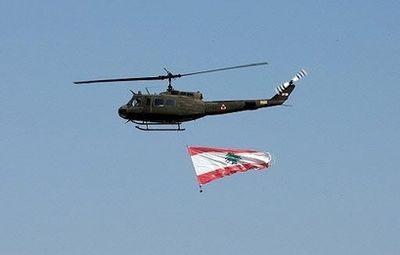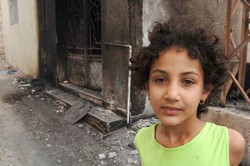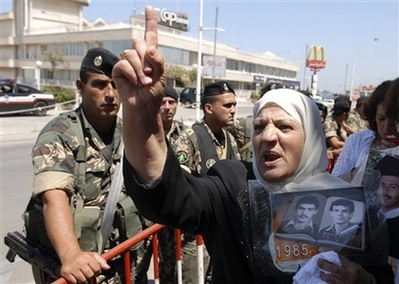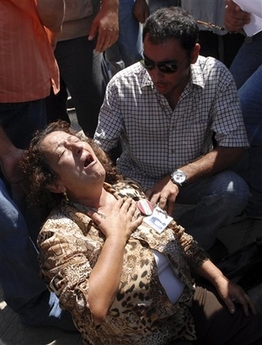Regarding the controversial issue of how to refer to the resistance in the ministerial statement, Mitri said that the committee agreed on a phrase that speaks about the right of the Lebanese people, army and resistance to use any legal means to liberate the remainder of the Lebanese territories that are occupied by Israel, namely the Shebaa Farms, the Kafar Shuba Hills and the border village of Ghajar. Mitri explained that some committee members wanted the phrase on liberating Lebanon's remaining occupied territories to include a clause stating that such activities should be carried out under the guardianship of the Lebanese state. Mitri later gave the floor to Lahoud, who told reporters that he was still insisting that the statement should mention that the right to liberate the occupied territories should be exercised under the guardianship of the state. The issue of the resistance was reportedly the main hurdle that was causing the delay in issuing the draft statement. Telecommunications Minister Jebran Bassil also spoke to reporters after Friday's meeting, outlining his position on the new ministerial statement. Bassil, a senior member of MP Michel Aoun's Free Patriotic Movement, said that his party has succeeded in making some achievements through the ministerial statement. Bassil said that the FPM has succeeded in including in the statement a number of issues which were referred to as taboos in the past. Among such issues was the fate of Lebanese citizens who were reported missing in Syria or Lebanon following the end of Lebanon's 15-year Civil War, he said. Another issue raised in the draft, according to Bassil, was the fate of some Lebanese nationals who fled to Israel following Israel's withdrawal from South Lebanonin May 2000. "The state's duty is to urge these people to return to Lebanon," he said. He added that another achievement was the inclusion of a clause clearly rejecting the resettlement of Palestinians refugees in Lebanon.  By Hussein Abdallah, BEIRUT: The ministerial committee in charge of drafting the new government's platform finally thrashed out a policy statement late Friday, with the council of ministers expected to ratify the draft on Monday before presenting it to Parliament later next week. Information Minister Tarek Mitri walked out of the committee's 14th and final meeting to tell reporters at the Grand Serail that the committee has finally reached an agreement over the ministerial statement despite some reservations by Minister of State Nassib Lahoud. Mitri said that the reservations, which were later clarified by Lahoud, would hopefully be dropped after further consultations between the ministers and Prime Minister Fouad Siniora ahead of an expected cabinet session on Monday.
By Hussein Abdallah, BEIRUT: The ministerial committee in charge of drafting the new government's platform finally thrashed out a policy statement late Friday, with the council of ministers expected to ratify the draft on Monday before presenting it to Parliament later next week. Information Minister Tarek Mitri walked out of the committee's 14th and final meeting to tell reporters at the Grand Serail that the committee has finally reached an agreement over the ministerial statement despite some reservations by Minister of State Nassib Lahoud. Mitri said that the reservations, which were later clarified by Lahoud, would hopefully be dropped after further consultations between the ministers and Prime Minister Fouad Siniora ahead of an expected cabinet session on Monday.
 Lebanese women cannot pass on their nationality to their children and in the event of separation, it is the father who gains automatic custody BEIRUT, 22 July 2008 (IRIN) - Thousands of children in Lebanon are denied full access to education, healthcare and residency because they do not have Lebanese citizenship. Lebanese women cannot pass on their nationality to their children and in the event of separation, it is the father who gains automatic custody, according to Lebanese nationality law. There is a saying in Lebanon: The only woman you
Lebanese women cannot pass on their nationality to their children and in the event of separation, it is the father who gains automatic custody BEIRUT, 22 July 2008 (IRIN) - Thousands of children in Lebanon are denied full access to education, healthcare and residency because they do not have Lebanese citizenship. Lebanese women cannot pass on their nationality to their children and in the event of separation, it is the father who gains automatic custody, according to Lebanese nationality law. There is a saying in Lebanon: The only woman you
BEIRUT (AFP) – Firemen battled a forest fire in Lebanon on Tuesday, amid exploding cluster bombs and the danger of mines left over …
 By Jessica Naimeh, BEIRUT: Parents of Lebanese held in Syrian prisons went once again to the streets on Monday morning protesting against the detention in Syria of their relatives. The demonstration took an unfortunate turn of events as the Lebanese Armed Forces (LAF) violently forced the protesters to move away as they were trying to intercept Syrian Foreign Minister Walid Moallem's convoy to the presidential palace in Baabda. The protest was organized with the help of the civil society representatives, human-rights associations and local and international NGOs. The groups have held similar demonstrations in the past, but this time, the protest was called to coincide with Moallem's visit to Lebanon.
By Jessica Naimeh, BEIRUT: Parents of Lebanese held in Syrian prisons went once again to the streets on Monday morning protesting against the detention in Syria of their relatives. The demonstration took an unfortunate turn of events as the Lebanese Armed Forces (LAF) violently forced the protesters to move away as they were trying to intercept Syrian Foreign Minister Walid Moallem's convoy to the presidential palace in Baabda. The protest was organized with the help of the civil society representatives, human-rights associations and local and international NGOs. The groups have held similar demonstrations in the past, but this time, the protest was called to coincide with Moallem's visit to Lebanon.  "We, as civil society organizations, want to confirm the existence of Lebanese detainees in Syrian prisons," said Ghazi Aad, founder of Support of Lebanese in Detention and Exile (SOLIDE), an NGO which has longed worked to uncover the fate of Lebanese detainees in Syrian prisons. Parents and relatives of Lebanese citizens who disappeared between 1975 and 2005 gathered around 10:30 a.m. next to the presidential palace in Baabda, where Moallem was expected to arrive. Many protestors held pictures of their detained or lost relatives as well as banners with slogans written in Arabic such as "no [diplomatic] relations before the return [of the Lebanese held in Syrian prisons]" or "not only are there [prisoners] in Israel, but in Syria as well." As Moallem's convoy was about to reach the presidential palace, demonstrators tried to block the road and were aggressively pushed and beaten up by LAF forces. Some demonstrators suffered wounds as a result. In a news conference after his parliamentary bloc's meeting on Monday, Free Patriotic Movement leader MP Michel Aoun said clashes between demonstrators and the LAF "were truly unfortunate," adding that the new government would "double efforts" to uncover the fate of detainees in Syrian prisons issue as "the fate of these missing people could not be ignored." According to a researcher with Human Rights Watch, Nadim Houri, who took part in Monday's protest, the demonstrators were "violently pushed by the LAF who used the bottoms of their rifles" to move the crowd away. He said that none of the protesters was armed, so there was "no need to resort to such kind of violence." Houri told The Daily Star that mothers of detainees were violently pushed in the process, saying that the "LAF ought to adopt strict guidelines that ban the use of violence to disperse demonstrators." Meanwhile, Free Patriotic Movement leader MP Michel Aoun said after a meeting of his Reform and Change parliamentary bloc on Monday that a Lebanese minister of state should be assigned the duty of following up on the issue of Lebanese detainees in Syria.
"We, as civil society organizations, want to confirm the existence of Lebanese detainees in Syrian prisons," said Ghazi Aad, founder of Support of Lebanese in Detention and Exile (SOLIDE), an NGO which has longed worked to uncover the fate of Lebanese detainees in Syrian prisons. Parents and relatives of Lebanese citizens who disappeared between 1975 and 2005 gathered around 10:30 a.m. next to the presidential palace in Baabda, where Moallem was expected to arrive. Many protestors held pictures of their detained or lost relatives as well as banners with slogans written in Arabic such as "no [diplomatic] relations before the return [of the Lebanese held in Syrian prisons]" or "not only are there [prisoners] in Israel, but in Syria as well." As Moallem's convoy was about to reach the presidential palace, demonstrators tried to block the road and were aggressively pushed and beaten up by LAF forces. Some demonstrators suffered wounds as a result. In a news conference after his parliamentary bloc's meeting on Monday, Free Patriotic Movement leader MP Michel Aoun said clashes between demonstrators and the LAF "were truly unfortunate," adding that the new government would "double efforts" to uncover the fate of detainees in Syrian prisons issue as "the fate of these missing people could not be ignored." According to a researcher with Human Rights Watch, Nadim Houri, who took part in Monday's protest, the demonstrators were "violently pushed by the LAF who used the bottoms of their rifles" to move the crowd away. He said that none of the protesters was armed, so there was "no need to resort to such kind of violence." Houri told The Daily Star that mothers of detainees were violently pushed in the process, saying that the "LAF ought to adopt strict guidelines that ban the use of violence to disperse demonstrators." Meanwhile, Free Patriotic Movement leader MP Michel Aoun said after a meeting of his Reform and Change parliamentary bloc on Monday that a Lebanese minister of state should be assigned the duty of following up on the issue of Lebanese detainees in Syria.
Khazen History


Historical Feature:
Churches and Monasteries of the Khazen family

St. Anthony of Padua Church in Ballouneh
Mar Abda Church in Bakaatit Kanaan
Saint Michael Church in Bkaatouta
Saint Therese Church in Qolayaat
Saint Simeon Stylites (مار سمعان العامودي) Church In Ajaltoun
Virgin Mary Church (سيدة المعونات) in Sheilé
Assumption of Mary Church in Ballouneh
1 - The sword of the Maronite Prince
2 - LES KHAZEN CONSULS DE FRANCE
3 - LES MARONITES & LES KHAZEN
4 - LES MAAN & LES KHAZEN
5 - ORIGINE DE LA FAMILLE
Population Movements to Keserwan - The Khazens and The Maans
ما جاء عن الثورة في المقاطعة الكسروانية
ثورة أهالي كسروان على المشايخ الخوازنة وأسبابها
Origins of the "Prince of Maronite" Title
Growing diversity: the Khazin sheiks and the clergy in the first decades of the 18th century
Historical Members:
Barbar Beik El Khazen [English]
Patriach Toubia Kaiss El Khazen(Biography & Life Part1 Part2) (Arabic)
Patriach Youssef Dargham El Khazen (Cont'd)
Cheikh Bishara Jafal El Khazen
Patriarch Youssef Raji El Khazen
The Martyrs Cheikh Philippe & Cheikh Farid El Khazen
Cheikh Nawfal El Khazen (Consul De France)
Cheikh Hossun El Khazen (Consul De France)
Cheikh Abou-Nawfal El Khazen (Consul De France)
Cheikh Francis Abee Nader & his son Yousef
Cheikh Abou-Kanso El Khazen (Consul De France)
Cheikh Abou Nader El Khazen
Cheikh Chafic El Khazen
Cheikh Keserwan El Khazen
Cheikh Serhal El Khazen [English]
Cheikh Rafiq El Khazen [English]
Cheikh Hanna El Khazen
Cheikha Arzi El Khazen
Marie El Khazen